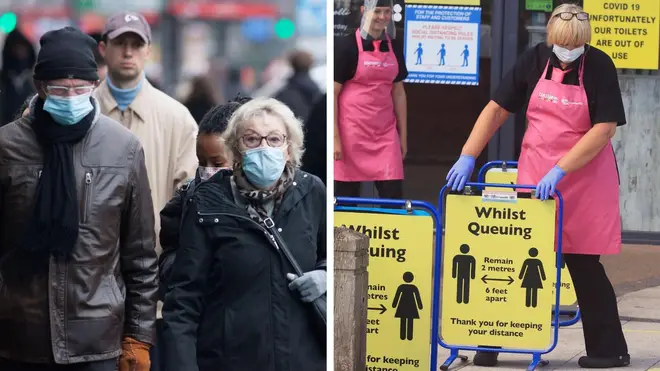
Nick Abbot 10pm - 1am
26 December 2021, 09:11 | Updated: 7 June 2023, 08:56

New restrictions are being introduced in Wales, Scotland and Northern Ireland to reduce the spread of Omicron, while politicians in England wait for more data.
England has become the only part of the UK to not introduce further Covid restrictions from Boxing Day, in a bid to stop the spread of Omicron.
It is understood a Covid O meeting is yet to be scheduled as ministers await further data, but Downing Street did not rule out the possibility one could take place on Monday to assess the impact of Omicron and whether further restrictions are needed.
The rule of six returned to the hospitality industry in Wales from Boxing Day, affecting pubs, cinemas and restaurants.
Nightclubs closed and two-metre social distancing will now be required in public premises and offices and indoor events will be restricted to 30 people - while 50 people will be allowed at outdoor events.
The new rules, in force from 6am, are a revised version of alert level two.
Simon Buckley, who runs The Cricketers pub in Cardiff, told LBC he thinks the measures are disproportionate.
Read more: PM will wait until after Christmas Day to announce any Covid restrictions for England
Read more: 999 workers describe the camaraderie of working on Christmas Day

Cardiff pub manager says new Covid restrictions are disproportionate
He said December trade had been "sailing" but he has gradually seen the numbers drop.
"It is really bad," he told LBC, ahead of the new rules coming into force.
"People out there just don't know the impact it is having on hospitality."
He described the new restrictions, brought in by the First Minister of Wales Mark Drakeford, as "the final straw".
Meanwhile, Nicola Sturgeon is also reintroducing measures in Scotland to combat the spread of the Omicron variant, which is thought to be more transmissible than Delta.
Large events will have one metre physical distancing and will be limited to 100 people standing indoors, 200 people sitting indoors and 500 people outdoors.

Rachel Johnson says Boris insisted on Covid rules
A day later, up to three households can meet with a one metre distancing between groups at indoor and outdoor venues like bars, restaurants, theatres, cinemas and gyms.
Table service is also needed at places where alcohol is served.
Northern Ireland is also bringing in restrictions on Boxing Day and December 27, with indoor standing events no longer permitted and nightclubs closing.
Read more: Queen pays tribute to Prince Philip in Christmas speech: 'One familiar laugh is missing'
Socialising will be reduced to three households while up to six people can meet in pubs, bars and restaurants. Ten people will be allowed if they are from the same household. Only table service will be available.
A two metre social distancing rule will be in place in public premises and offices.
Despite continued pressure on the Prime Minister Boris Johnson, he is yet to impose any changes in England - unlike the devolved nations.

Shapps: PM still has authority on Covid-19
He said he will not hesitate to act after Christmas if required amid rising cases of the Omicron variant, and it is understood a meeting could take place on Monday.
The government says it is 'monitoring' Covid data after early studies found Omicron may cause milder illness than Delta.
Read more: Omicron ‘milder than Delta’, study suggests - as PM urged to set out post-Xmas Covid plans
Research from Imperial College London indicates that people with PCR-confirmed Omicron are 15 to 20% less likely to need admission to hospital, and 40 to 45 per cent less likely to require a stay of one night or more.
The government may choose to issue new voluntary guidance on limiting contacts rather than risk another damaging Tory rebellion by recalling Parliament to impose new rules beyond the existing Plan B measures.
However, it is understood school closures are not being considered for January.
A source close to Education Secretary Nadhim Zahawi said: "The PM and Nadhim are fully committed to keeping schools open, and there's a shared commitment across Government to do so.
"Education is a top priority and school closures are not something being considered."